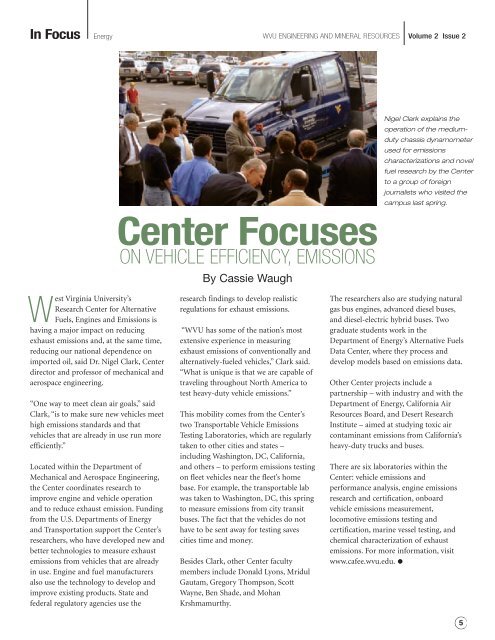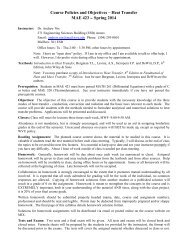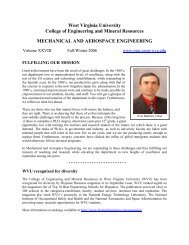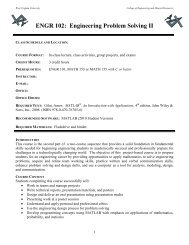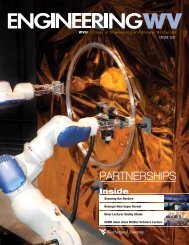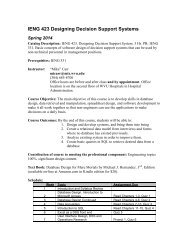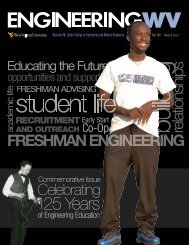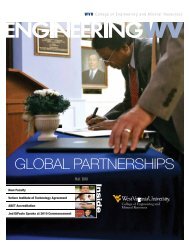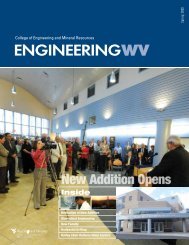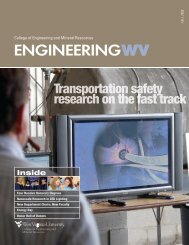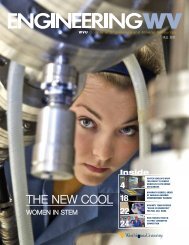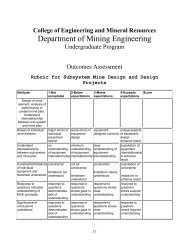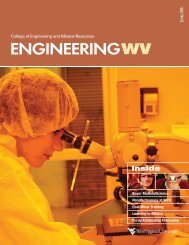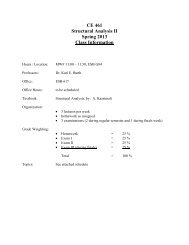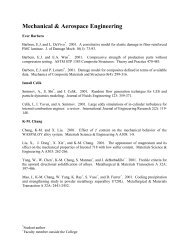63213 06FallWVUCEMR, page 1-40 @ Normalize - WVU College of ...
63213 06FallWVUCEMR, page 1-40 @ Normalize - WVU College of ...
63213 06FallWVUCEMR, page 1-40 @ Normalize - WVU College of ...
Create successful ePaper yourself
Turn your PDF publications into a flip-book with our unique Google optimized e-Paper software.
In Focus<br />
Energy<br />
<strong>WVU</strong> ENGINEERING AND MINERAL RESOURCES Volume 2 Issue 2<br />
Nigel Clark explains the<br />
operation <strong>of</strong> the mediumduty<br />
chassis dynamometer<br />
used for emissions<br />
characterizations and novel<br />
fuel research by the Center<br />
to a group <strong>of</strong> foreign<br />
journalists who visited the<br />
campus last spring.<br />
Center Focuses<br />
ON VEHICLE EFFICIENCY, EMISSIONS<br />
By Cassie Waugh<br />
West Virginia University’s<br />
Research Center for Alternative<br />
Fuels, Engines and Emissions is<br />
having a major impact on reducing<br />
exhaust emissions and, at the same time,<br />
reducing our national dependence on<br />
imported oil, said Dr. Nigel Clark, Center<br />
director and pr<strong>of</strong>essor <strong>of</strong> mechanical and<br />
aerospace engineering.<br />
“One way to meet clean air goals,” said<br />
Clark, “is to make sure new vehicles meet<br />
high emissions standards and that<br />
vehicles that are already in use run more<br />
efficiently.”<br />
Located within the Department <strong>of</strong><br />
Mechanical and Aerospace Engineering,<br />
the Center coordinates research to<br />
improve engine and vehicle operation<br />
and to reduce exhaust emission. Funding<br />
from the U.S. Departments <strong>of</strong> Energy<br />
and Transportation support the Center’s<br />
researchers, who have developed new and<br />
better technologies to measure exhaust<br />
emissions from vehicles that are already<br />
in use. Engine and fuel manufacturers<br />
also use the technology to develop and<br />
improve existing products. State and<br />
federal regulatory agencies use the<br />
research findings to develop realistic<br />
regulations for exhaust emissions.<br />
“<strong>WVU</strong> has some <strong>of</strong> the nation’s most<br />
extensive experience in measuring<br />
exhaust emissions <strong>of</strong> conventionally and<br />
alternatively-fueled vehicles,” Clark said.<br />
“What is unique is that we are capable <strong>of</strong><br />
traveling throughout North America to<br />
test heavy-duty vehicle emissions.”<br />
This mobility comes from the Center’s<br />
two Transportable Vehicle Emissions<br />
Testing Laboratories, which are regularly<br />
taken to other cities and states –<br />
including Washington, DC, California,<br />
and others – to perform emissions testing<br />
on fleet vehicles near the fleet’s home<br />
base. For example, the transportable lab<br />
was taken to Washington, DC, this spring<br />
to measure emissions from city transit<br />
buses. The fact that the vehicles do not<br />
have to be sent away for testing saves<br />
cities time and money.<br />
Besides Clark, other Center faculty<br />
members include Donald Lyons, Mridul<br />
Gautam, Gregory Thompson, Scott<br />
Wayne, Ben Shade, and Mohan<br />
Krshmamurthy.<br />
The researchers also are studying natural<br />
gas bus engines, advanced diesel buses,<br />
and diesel-electric hybrid buses. Two<br />
graduate students work in the<br />
Department <strong>of</strong> Energy’s Alternative Fuels<br />
Data Center, where they process and<br />
develop models based on emissions data.<br />
Other Center projects include a<br />
partnership – with industry and with the<br />
Department <strong>of</strong> Energy, California Air<br />
Resources Board, and Desert Research<br />
Institute – aimed at studying toxic air<br />
contaminant emissions from California’s<br />
heavy-duty trucks and buses.<br />
There are six laboratories within the<br />
Center: vehicle emissions and<br />
performance analysis, engine emissions<br />
research and certification, onboard<br />
vehicle emissions measurement,<br />
locomotive emissions testing and<br />
certification, marine vessel testing, and<br />
chemical characterization <strong>of</strong> exhaust<br />
emissions. For more information, visit<br />
www.cafee.wvu.edu.<br />
5


